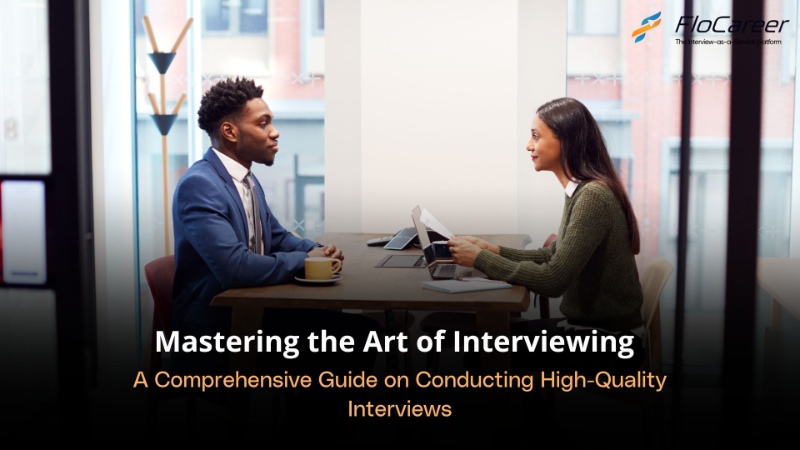Mastering the Art of Conducting High-Quality Interviews: A Comprehensive Guide
Embarking on the journey of conducting high-quality interviews is a crucial aspect of hiring the best candidates for your organization. An effective and well-prepared interview not only reveals insights about the candidate but also provides them with an opportunity to learn more about your company. Let's explore the best practices and tips for elevating the quality of your interviews, focusing on interview preparation, active listening, and effective monitoring.

Interview Preparation: Setting the Stage for Success
Conduct Proper Research:
To embark on a successful interview journey, the first step is conducting thorough research on the candidate. Dive into their professional background, scrutinize their current workplace dynamics, and explore relevant discussion topics. This diligent research serves as the bedrock for a well-prepared interview, enabling you to craft questions that resonate with the candidate's experiences and aspirations.
This pre-interview reconnaissance is not merely about gathering facts; it's about demonstrating a genuine interest in the individual. By delving into their professional history, you not only showcase your commitment to understanding their journey but also lay the foundation for building a strong rapport during the interview.
Prepare Thoughtful Questions:
The formulation of thought-provoking questions is an art that can significantly elevate the quality of your interview. Once armed with insights from your research, develop a curated list of open-ended questions. These questions are designed to go beyond simple 'yes' or 'no' responses, encouraging candidates to share their thoughts, opinions, and experiences in a more profound manner.
The structure of your questions is paramount. Logical sequencing creates an organic flow in the conversation, facilitating a comprehensive exploration of the candidate's qualifications and suitability for the role. Crafting questions with precision ensures that the interview becomes a platform for the candidate to showcase their abilities and allows you to gauge their compatibility with your organization's values.
Test Your Line of Questioning:
While your questions might seem impeccable on paper, it's essential to validate their effectiveness before the interview. Share your question set with your recruiting team or an HR professional to gather valuable feedback. This collaborative approach not only provides diverse perspectives but also helps in refining your line of questioning.
The goal here is clarity and comprehension. Ensure that your questions are clear, concise, and easy to understand. Feedback from your team allows you to address any potential ambiguities and fine-tune your approach, setting the stage for a seamless and effective interview experience.
For Video Interviews:
In an era where virtual interactions have become commonplace, preparing for video interviews demands special attention. Ensuring the proper functioning of technology is crucial. Test the camera, microphone, and internet connection well in advance to avoid technical glitches that could disrupt the flow of the interview.
Choosing the right environment for a video interview is equally important. Opt for a quiet, well-lit, and professional background to create a distraction-free setting. The ambiance you present not only reflects your professionalism but also contributes to the overall impression the candidate forms about your organization. Clear and concise online communication, coupled with attentive listening, enhances the virtual interview experience and aids in the selection of quality employees.
In essence, interview preparation is an intricate process that involves meticulous research, thoughtful question formulation, and adaptability for various interview formats. By investing time and effort in this preparatory phase, you lay the groundwork for a successful and productive interview that not only benefits your organization but also provides a positive experience for the candidates involved.
During the Interview: Navigating with Purpose
Build a Strong Rapport:
Initiate the interview by introducing yourself, creating a comfortable environment for the candidate.
Allow candidates ample time to share their thoughts and experiences without interruptions, establishing a free-flowing conversation.
Explain the Interview Process:
Inform the candidate about the interview format, the number of interviewers, and the expected duration.
Provide details about interviewers and any work-related tests or assessments to maintain organization and set clear objectives and expectations.
Active Listening:
Take notes when necessary, and listen attentively to the candidate's responses.
Avoid interruptions and ask follow-up questions post their response to gain a deeper understanding.
Active listening is crucial for comprehending perspectives, ensuring a quality hire.
Flexibility:
Be open to adjusting the interview structure based on valuable insights provided by the candidate.
Politely redirect the conversation if it goes off-topic, ensuring the interview's structure is maintained for a productive session.
Monitoring and Tracking Interview Quality: Ensuring Consistency
Develop an Interview Scorecard:
Introduce an interview scorecard assessing essential skills for the job, providing a standardized evaluation.
Utilize the scorecard to track interview quality over time, identifying areas for improvement and ensuring a consistently high-quality interview process.
Monitor Interview Performance:
Evaluate interviewer performance through methods like observation, review of notes, and feedback assessments.
Offer constructive feedback and training to enhance interviewer skills, maintaining a standard for high-quality interviews.
Seek Feedback from Candidates:
Collect feedback from candidates through surveys or post-interview recording reviews.
Candidate insights provide valuable perspectives, aiding in identifying areas for improvement and maintaining interview quality.
Analyze and Track Hiring Outcomes:
Analyze the performance of hired candidates to assess the effectiveness of the interview process.
Tracking retention rates, performance metrics, and other relevant indicators contributes to maintaining interview quality.
In the pursuit of excellence in interviews, organizations can benefit from the expertise offered by Flocareer. By outsourcing interviews with Flocareer, organizations can access diverse interview panels, standardized processes, and a commitment to eliminating biases. Flocareer's approach ensures a hiring process that prioritizes fairness, equality, and the selection of the right candidates, contributing to the success and diversity of your workforce.
Check out our latest blog on conducting unbiased interviews


